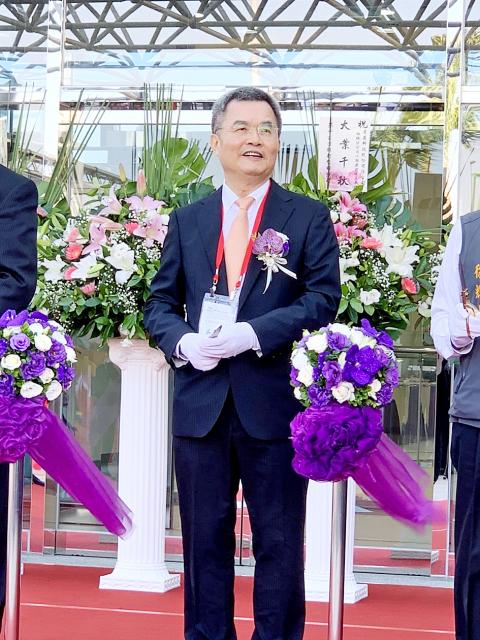Taimide Technology Inc (達邁科技) yesterday launched a new production line in Miaoli County, boosting its polyimide (PI) film capacity by 40 percent as it targets the growing demand for 5G foldable smartphones.
Taimide spent NT$1.8 billion (US$58.8 million), its biggest ever investment, building a new production line in Tongluo Industrial Park (銅鑼園區), as well as a research-and-development center.
The new production line is to add 600 tonnes of PI film to the company’s existing capacity of 1,500 tonnes a year, helping fuel revenue growth momentum, a Hsinchu Science Park Administration statement said.

Photo: Cho Yi-chun, Taipei Times
Fifteen companies have invested NT$112.61 billion to set up factories in the industrial park, which is part of the Hsinchu Science Park, the administration said.
About 65 percent of the PI film produced by Taimide is used to make flexible printed circuit boards that are used in a wide range of electronic products such as smartphones, wearable devices and laptops, as well as the automotive sector, the company said.
The company has developed a new optical-level colorless PI film that can be used in flexible OLED displays for foldable smartphones and other flexible displays, it said.
Huawei Technologies Co (華為) and Samsung Electronics Co have taken the lead in rolling out foldable smartphones this year and other handset brands are expected to follow suit, Taimide chairman Wu Sheng-chang (吳聲昌) said.
Taimide expects 5G smartphones to be a new growth driver for its revenue, Wu said.
The company has previously said that high-end smartphones consume 20 to 30 percent more PI film than mid to low-end smartphones.
Taimide expects to return to revenue growth next year as it benefits from the increased capacity and a broader product portfolio, the Central News Agency reported.
Taimide posted revenue of NT$1.33 billion in the first nine months of this year, down 24.7 percent from NT$1.77 billion in the same period last year.
The company attributed the decline to a prolonged US-China trade dispute, which has curtailed the sales of smartphones and other electronic products.

BYPASSING CHINA TARIFFS: In the first five months of this year, Foxconn sent US$4.4bn of iPhones to the US from India, compared with US$3.7bn in the whole of last year Nearly all the iPhones exported by Foxconn Technology Group (富士康科技集團) from India went to the US between March and last month, customs data showed, far above last year’s average of 50 percent and a clear sign of Apple Inc’s efforts to bypass high US tariffs imposed on China. The numbers, being reported by Reuters for the first time, show that Apple has realigned its India exports to almost exclusively serve the US market, when previously the devices were more widely distributed to nations including the Netherlands and the Czech Republic. During March to last month, Foxconn, known as Hon Hai Precision Industry

Taiwan Semiconductor Manufacturing Co (TSMC, 台積電) and the University of Tokyo (UTokyo) yesterday announced the launch of the TSMC-UTokyo Lab to promote advanced semiconductor research, education and talent development. The lab is TSMC’s first laboratory collaboration with a university outside Taiwan, the company said in a statement. The lab would leverage “the extensive knowledge, experience, and creativity” of both institutions, the company said. It is located in the Asano Section of UTokyo’s Hongo, Tokyo, campus and would be managed by UTokyo faculty, guided by directors from UTokyo and TSMC, the company said. TSMC began working with UTokyo in 2019, resulting in 21 research projects,

Taiwan’s property market is entering a freeze, with mortgage activity across the nation’s six largest cities plummeting in the first quarter, H&B Realty Co (住商不動產) said yesterday, citing mounting pressure on housing demand amid tighter lending rules and regulatory curbs. Mortgage applications in Taipei, New Taipei City, Taoyuan, Taichung, Tainan and Kaohsiung totaled 28,078 from January to March, a sharp 36.3 percent decline from 44,082 in the same period last year, the nation’s largest real-estate brokerage by franchise said, citing data from the Joint Credit Information Center (JCIC, 聯徵中心). “The simultaneous decline across all six cities reflects just how drastically the market

Ashton Hall’s morning routine involves dunking his head in iced Saratoga Spring Water. For the company that sells the bottled water — Hall’s brand of choice for drinking, brushing his teeth and submerging himself — that is fantastic news. “We’re so thankful to this incredible fitness influencer called Ashton Hall,” Saratoga owner Primo Brands Corp’s CEO Robbert Rietbroek said on an earnings call after Hall’s morning routine video went viral. “He really helped put our brand on the map.” Primo Brands, which was not affiliated with Hall when he made his video, is among the increasing number of companies benefiting from influencer